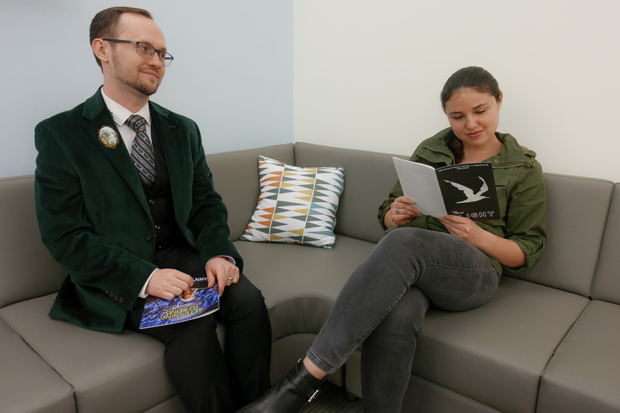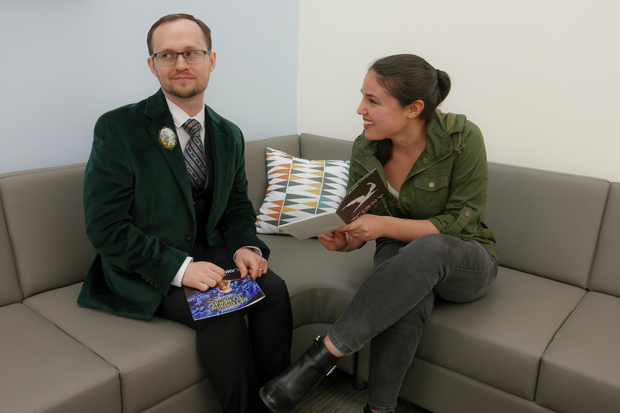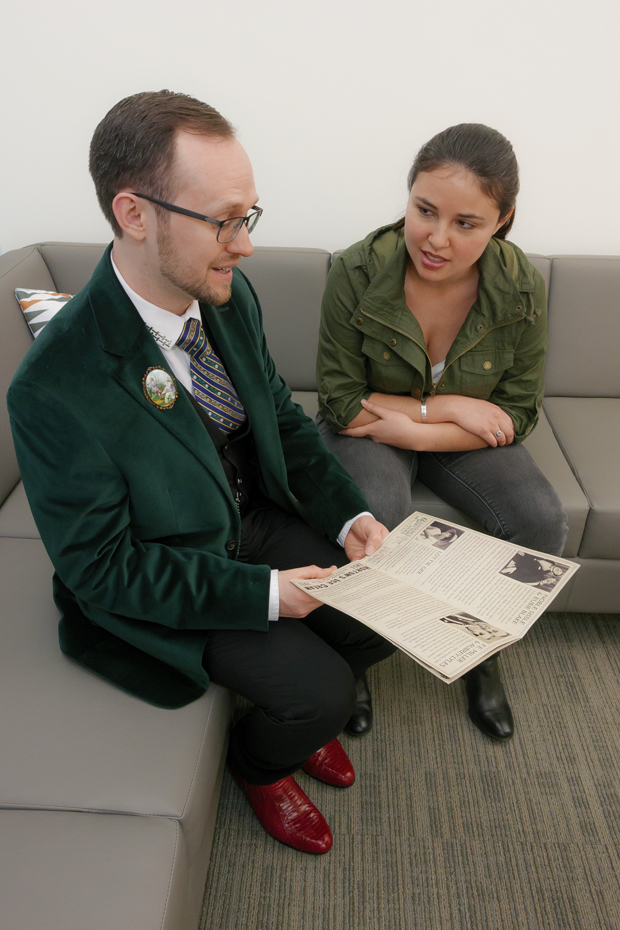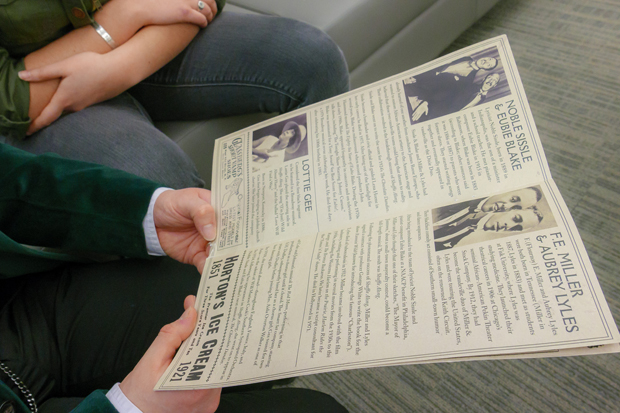Point-Counterpoint: Are Program Notes Ever a Good Idea?
Chances are you've read one, perhaps as you wait for your fellow theatergoers to take their seats and an 8pm curtain slowly turns into 8:15. We're talking about program notes, those tiny essays penned by playwrights, directors, and artistic directors that serve as your in-flight reading at the theater. But are they really a good idea when all eyes should be on the stage? Zachary Stewart thinks not, while Hayley Levitt finds them to be useful sources of context and information. Our two critics compare notes (and the absence thereof) in TheaterMania's latest Point-Counterpoint:

(© Seth Walters)
Zachary Stewart: Hayley, I've noticed that you always give the program notes a thorough read when you go to the theater. What do you get out of them?
Hayley Levitt: Exactly what the writer or director wants me to get out of them: context. When you go into a play, especially if you're going in totally blind, program notes can set the tone, provide historical background, or just generally explain in what spirit this particular work was created. You can certainly figure out a lot of those things from the play itself, but you have the chance to get more out of a production if you go in with a better understanding of the world you're being thrown into.
Zach: I think that's cheating. The playwright and director should be able to say everything they have to say onstage. If they need to write an essay to convey their ideas, they ought to go into academia instead of theater.
Hayley: I don't think that's entirely fair. Especially coming from a critic who I know does a good amount of research before reviewing. I remember you reading War Paint, a pretty hefty book I might add, before reviewing the Broadway musical. Clearly you felt that having a head start on the rivalry between Elizabeth Arden and Helena Rubinstein would either a) add to your experience of the show or b) make you more capable of evaluating it. How is that any different from program notes?

(© Seth Walters)
Zach: In the case of War Paint, I will forever regret wasting several hours of my life on a read that was less thrilling than watching paint dry (and only mildly more interesting than the musical). That's not always the case with my pre-review research, which is usually a rewarding experience because I'm learning things on my own. By contrast, program notes feed the audience research like a mother bird regurgitating into the mouths of her chicks. They are a way to reward a lack of intellectual curiosity with predigested talking-points.
Hayley: I'd like to think of them more like pool floaties. They won't take you far, but they'll keep you from drowning. Almost every show we see, whether we realize it or not, operates under the assumption that we have some kind of background knowledge. Take The Producers as an example. It's a brilliant comedy, but if you don't have the necessary historical context, there's no way for you to understand why a musical called Springtime for Hitler about an Axis victory in World War II is so funny. Mel Brooks assumed that his audiences were people with a basic understanding of world history, but if we're at a play that's commenting on a less conspicuous piece of history, program notes are an efficient way to get everyone on the same page.
Zach: I can get behind that. The old-timey program within every program at Shuffle Along was not only informative, but integrated into the design of the show. Timelines can also be useful. What I dislike is when the program note is used as a transparent way of telling the audience what to think about the show before they've even seen it. That's not only patronizing, but it has the potential to spectacularly backfire. I recently read a program note containing the fatal line, "Prepare to have your minds blown." Mine wasn't, and I was annoyed at the writer for setting the production up to fail with overblown expectations.

(© Seth Walters)
Hayley: Telling audiences how much they're going to love your show is definitely the wrong approach to program notes. The point of them is to enhance an experience, not rewrite it like we're in an Orwell novel. However, the more editorializing ones can be a helpful introduction to the author's voice. When you read something like "prepare to have your minds blown" you know right away what kind of writing you're in for. That writer clearly should have kept their cards a little closer to the vest.
Zach: As a critic, I find program notes to be a useful tool for judging the gap between the creative team's intention and the finished product. But really, why would you give your critics that kind of ammunition? It's the reason why so many MoMA exhibits have little placards that say things like "Untitled #61." By giving them less, you actually invite your audience to think more.
Hayley: You could also be depriving them of the jumping off point they need to have thoughts in the first place. Program notes don't have to connect all of the dots for you, but they could at least give you a hint about where to start your search for meaning — which in all likelihood will make for a more enjoyable experience all around. Otherwise, you're one of those poor confused people at MoMA wondering why Tilda Swinton is napping in a glass box.

(© Seth Walters)
Zach: Sometimes it is good to sit and wonder, especially if Tilda Swinton is involved. This is why I've become a fan of handing out the program after the show is over: It forces the audience to engage with the art in front of them, rather than the explanatory essay in their hands. Program notes don't necessarily need to be the source of easy answers, but as executed by the majority of theaters, they usually are.
Hayley: OK then, let's just start a Twitter campaign #betterprogramnotes.
Zach: I would, but I refuse to participate in that circular firing squad. Twitter is to society what program notes are to the theater: reductive, self-congratulatory, and on the way out.
Hayley: That's a debate for another day.










